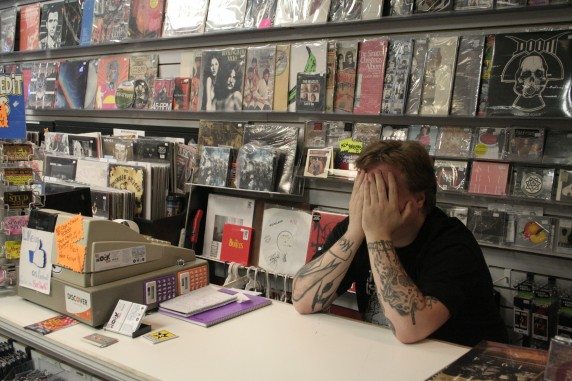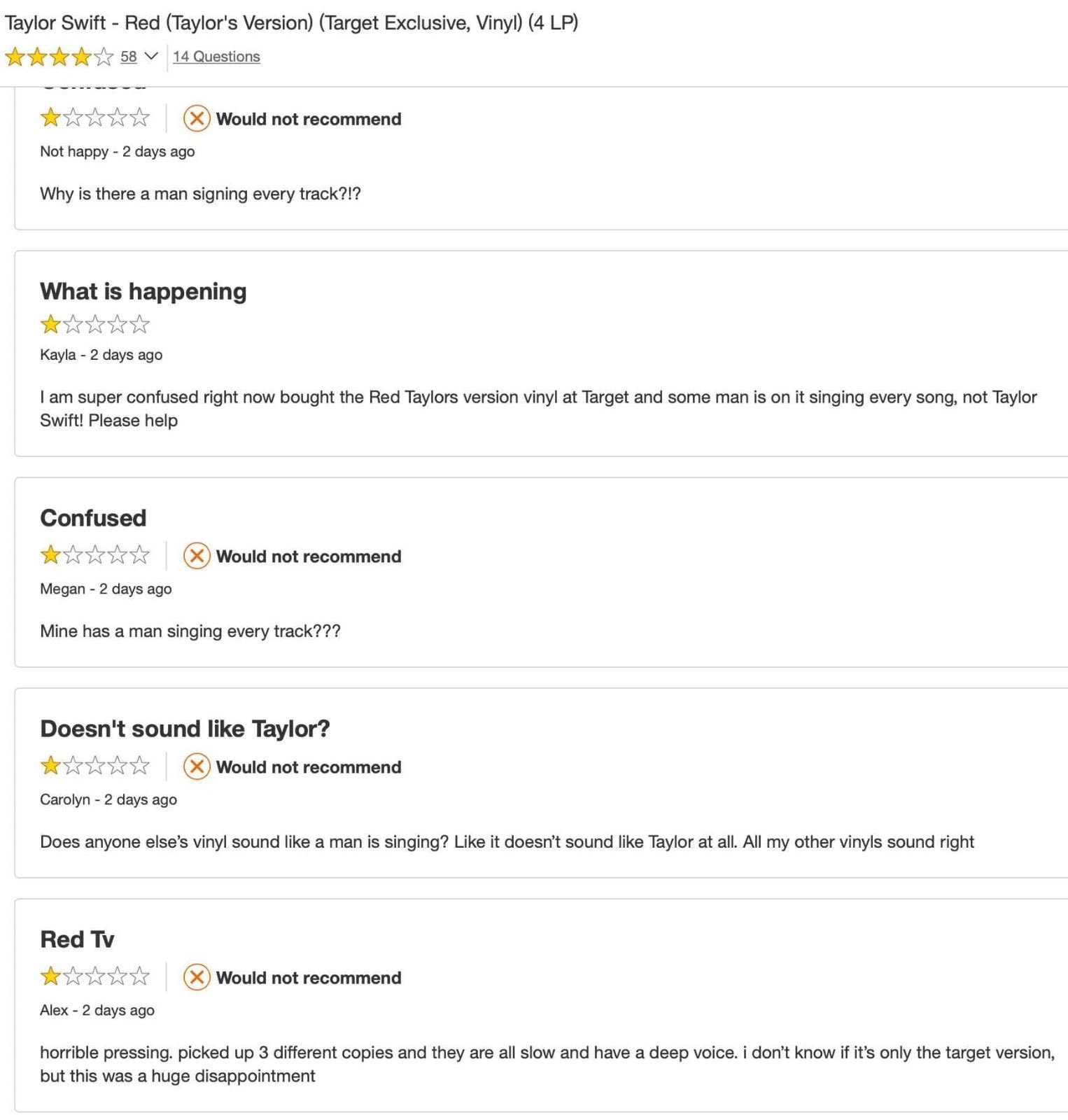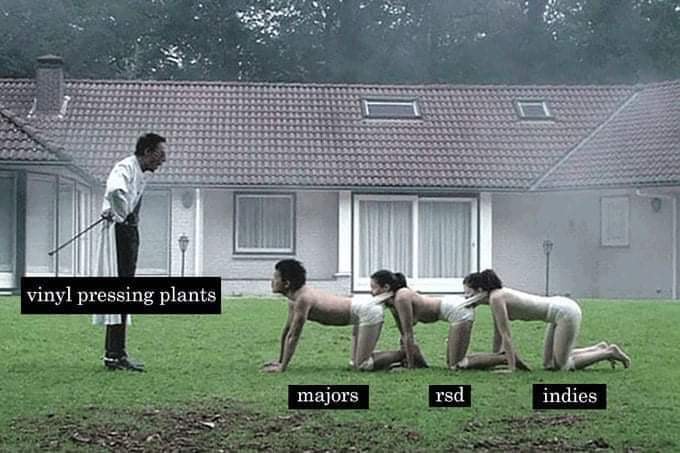
“We just approved the test presses. The record should be out in August.” I’m paraphrasing a bit, but the timeframe is correct. The band I spoke to about this had their masters submitted to the press plant in November. Of last fucking year. That’s a turnaround of 21 months. I’m personally working on a few vinyl releases and every label I’ve spoken to, regardless of country of origin, has said the same thing: “Cool, see you in a few years.”
Plenty has been said over the last decade about how the independent music scene’s long-standing love of vinyl had kept the format alive when the mainstream all but abandoned it, only to have that get thrown back in their faces once the major labels caught wind of it thanks to the proliferation of social media and wieners in Red Hook with ironic mustaches and organic window herb gardens — and probably a fucking unicycle — splattering themselves with the records they more than likely only took out as show pieces during wine tastings. The majors then slowly returned, like an abusive boyfriend trying to weasel his way back into to your life once you’ve finally gotten to a good place, so that he can fuck it all up again.
And the breaking point was the bricks used to pave the road to hell: Record Store Day.
Created over a decade ago to try to help bring attention to the brick-and-mortar indie record stores that were doing their best to withstand the paradigm shift of the terminal illness that plagued physical media, Record Store Day was a way for indie labels to create specially curated releases that only indie shops could access. That lasted for a year — fucking two tops. The first shot was fired by people who would graze at this event only to flip the records on eBay or Amazon for triple what they were initially sold, a feeding frenzy that would last a few days after the “holiday” then subside because people’s Fear of Missing Out would disintegrate and these records would crater in value. And the flippers weren’t just customers; the calls were coming from inside the house. Stores got into the action, at least the ones with the ethics of a death camp (like the one I worked at) and I’m somewhat torn on the issue. The RSD titles had little to no margin, so the ability to gain profit from them was stunted. The initial idea of Record Store Day was that it would drive people into stores, and they would — in theory — buy other shit besides the exclusive titles. In the few that I worked that wasn’t often the case unless you worked in some kind of sale to go along with it. But then the majors got involved.
A few years after what a celebration of the relationship between independent brick-and-mortar stores and independent labels was originally, collectors paying $75 dollars for online for a One Direction picture disc 7-inch, as an “investment,” much in the same mindset as the award winners who’re spending 10 racks on a gif… sorry a NFT. And then Record Store Day multiplied and latched on to another proud American tradition: Black Friday. Now people didn’t know if they wanted to camp out for 60% off a toaster at Walmart or a fucking Jim Croce reissue that’s on manhole thick vinyl and costs 20 times the used near-mint copy of the original languishing a few aisles over. Sure, RSD was bringing people into record stores, but now the majors were tricking them into buying shitty reissues of records that were so common Goodwill would give them to shelters to build forts.
As the years went on, vinyl pressing plants started raising their rates and extended the wait times around the April and November Record Store Days. Between this and shows like Pawn Stars driving the idea of vinyl as investment, as well as human interest pieces on the morning shows talking about the “return of vinyl,” it eventually gave birth to the unfortunate consequence that is a Taylor Swift vinyl. These are releases that were pressed in the millions, so many in fact Walmart and Target have vinyl sections now. The record pressing plants just cannot keep up with the major label hunger for releasing this shit on a format that they themselves declared dead and buried not even 20 years ago.
The new Adele record is apparently expected to be the highest selling vinyl record in years, if not ever. Millions of the fucking thing are being made to keep up with demand. And that new Taylor Swift? It’s a fucking FOUR-LP SET. The only plus side is that it’s pressed onto 45 RPM and her fans have no fucking idea what kind of sorcery this is.

These are probably the two biggest examples of why the shitter’s full at the plants and why half the records being put into queue right now for smaller bands will probably only come out years after they’ve broken up. You see this shit on Wayfair commercials where a bunch of 30-something white people all dressed in sweaters are sitting around listening to vinyl while drinking wine. The people buying vinyl in bulk now are the same people a few years ago whose music collection was a few soundtracks and maybe a greatest hits collection.
Indie labels are fucking crippled, especially the ones that only do a few releases a year and are run by people who have full-time jobs and not enough money to allow a few thousand to be tied up, sometimes now for years. You’re going to see a lot of labels shutter their doors because of this and even more never getting off the ground because an 18-month wait for a 7-inch isn’t worth the stress.
So, where does this lead? Cassettes? For the last few years there’s been a massive cassette revival in underground music for a few reasons: They’re cheap to produce and they have a quick turnaround time. Well, I should say were and had. The cost of manufacturing cassettes has steadily gone up the last few years, mostly because the demand has gone up and, again, this is America, and we love nothing more than to gouge the fuck out of the consumer. But at least there’s only a few-week turnaround, right? Yeah, no. Those container ships that are just chilling at sea? They have screws on them. Little screws that go into cassettes. Little screws that are going fucking nowhere. So now the cassette plants are slower than usual. Factor in that indie labels are now using cassette versions as stopgaps for the vinyl they’re waiting eight fucking trimesters for, and this leads us back to a format that even most indie labels have given up on: the CD.
I rarely buy CDs, mostly because my car doesn’t have a CD player and now my laptop doesn’t have a disc drive, but years back at the record store, I made sure we began carrying CDs in a strong capacity because somewhere down the line I figured there would be some kind of CD “revival.” And I was somewhat right, but not for the reasons I thought. I swore it would be nostalgia, much like the record boom 10 years ago, since nostalgia is in the driver’s seat for nearly everything cultural for anyone over the age of 23. But no, it’s not those rose-colored glasses. In fact, it’s more artificial than that. CDs are now the best way labels to keep themselves afloat while they have money tied up in vinyl and cassette. And CDs have gotten the wet shit covered end of the stick for years now, much the way vinyl did in the ’90s. “You still make CDs?” kind of stigma, generally said by some asshole with a cassette collection they’ve never taken off the shelf. I take no issue with CDs, for decades they were my main source of listening, and I’m glad labels have an outlet to be able to release something physical.
Or do they?
Now even CDs are starting to be backed up at plants. And for once this isn’t the majors’ fault. They still pump out CD versions of all of their mainstream artists, albeit to decreasing annual sales. But if those wine-drinking assholes catch wind that CDs are “cool” again, it’ll only take a few minutes before the major labels try to slip a finger in, like Ted Cruz at a dog park.

What’s the end point here? Vinyl is fucked, cassettes are fucked and CDs, while on the rise, are riding an artificial wave and are probably fucked as well. I fully expected to see the death of physical media in my lifetime, but I didn’t expect it to happen like this. And if all this physical product is in limbo, then what’s the point of record labels? Bands can digitally release their records themselves, which allows for greater artist autonomy. Freedom to maneuver their way across their own progression without input from pushy A&R types or the freedom to crash and burn with their pants around their ankles and everyone laughing at their tiny dicks. It’s a complete paradigm shift that was already in motion, but I thought it would be driven by technology, not the lack of tiny screws and a 4-LP set that the people who bought it can’t figure out how to play.
So here we are, at a very confusing and somewhat depressing time to be people who love music enough to make it our lives (and casual fans who’re still reading as well) where we can’t move forward with anything because there needs to be another Fleetwood Mac live LP for the Black Friday Record Store Day and are sitting with an uncertain future. And the brick-and-mortar record stores? This impacts them as well, as rising production costs means higher wholesale costs and lower margins. It’s the butterfly effect, only with a shitty soundtrack that people keep playing at the wrong speed.
"low" - Google News
November 25, 2021 at 11:44PM
https://ift.tt/3l5aeiY
Low Fidelity: Adele, Record Store Day and Why You'll Take CDs and Like It! - decibelmagazine.com
"low" - Google News
https://ift.tt/2z1WHDx
Bagikan Berita Ini

















0 Response to "Low Fidelity: Adele, Record Store Day and Why You'll Take CDs and Like It! - decibelmagazine.com"
Post a Comment